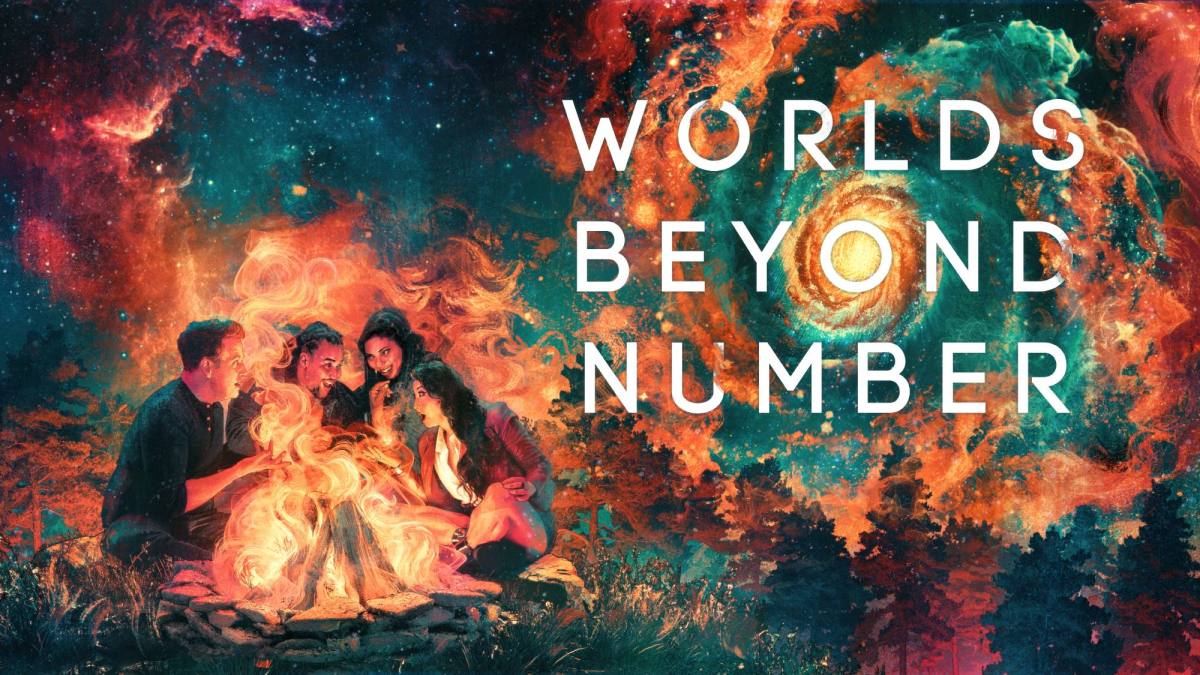“If you could open this article sort of Rolling Stone style…” Brennan Lee Mulligan suggests, then without changing his tone, pitches his lede: “In a Corvette, racing down the 5, [podcast producer] Taylor Moore swerves, then bites right into a massive wheel of brie cheese…”
It’s what you’d expect from Mulligan, who got his start as an improv comic at College Humor, which spun off Dropout, a subscription-based comedy hub known for its particular flavor of clever, quick-on-its-feet humor. In recent years, Mulligan began professionally orchestrating tabletop roleplaying games (TTRPGs) as the game master on Dropout’s ultra popular “Dimension 20” web series, ascending to something like Dungeons & Dragons royalty in the process.
Of course, we are not actually in a Corvette — as they say in Dungeons & Dragons, this is all in the “theater of the mind.” But for anyone who follows TTRPG actual play media, the unfortunately brie-free Zoom meeting on my laptop screen is probably more thrilling than a sports car.
Mulligan is part of a new powerhouse crew of TTRPG creators teaming up to introduce “Worlds Beyond Number,” a new audio fiction podcast that will launch in March with a Dungeons & Dragons campaign. He’s joined by ubiquitous video game voice actor Erika Ishii, Dimension 20’s Lou Wilson and Aabria Iyengar, who has spun imaginative original stories with Dimension 20 and Critical Role in recent D&D campaigns.
“There’s just something about the chemistry of this group that feels special,” Ishii told TechCrunch. “When you find people to create with, you gotta grab onto them and just keep doing that for the rest of your lives together. So, we figure we might as well put a ring on it.”
“Oh, a podcast is a new ring for creators!” interjected Iyengar.
If you’re of a particular generation, you could say that “Worlds Beyond Number” is to TTRPG podcasting as Boygenius is to indie music. And if that reference makes no sense, well… does Crosby, Stills, Nash & Young ring a bell?
Aside from its all-star cast, “Worlds Beyond Number” is unlike anything that the four performers have done before — and that’s because they actually own the project.
“We get to decide our own fate,” said Ishii. “We are not beholden to anybody else except for ourselves, and our creative sensibilities, and to the fans that are the ones supporting us.”
Iyengar is also looking forward to the creative freedom. “There is something so freeing in having the moment where you look at the table and go like, this is going to be whatever I want it to be, whatever we decide it’s going to be, and that feels so beautiful.”
At the stroke of midnight on February 1, more than 2,500 people watched the cast livestream on Instagram as they launched the Patreon page for the podcast. While the show will be available for free on standard podcast apps, fans can sign up for $5 per month to get behind-the-scenes, bonus content for the show, including a prequel campaign known as “The Children’s Adventure.”
Within thirty minutes of going live on Patreon, “Worlds Beyond Number” reached 3,500 patrons. By about 1:30 PM the following day, they hit 9,400 patrons. That means the show will already rake in over $47,000 per month, minus Patreon’s cut (around 10% depending on the creator’s choice of tier) and taxes.

Image Credits: Worlds Beyond Number
“There’s something about the simplicity of people saying like, ‘I love these creators, I want to support what they’re doing, so I’m going to come support it.’ And we get to share a bunch of that behind-the-scenes stuff with them as a result of that,” said Mulligan. “It just feels like the firm handshake of a square deal. It feels so pleasing. There’s no weird element.”
By making an independent podcast, the cast doesn’t have to jump through the corporate and bureaucratic hoops that are ever-present in the creative arts.
Three years ago, IAC sold CH Media, the parent company of CollegeHumor and streaming service Dropout, where “Dimension 20” airs. The company’s chief creative officer Sam Reich bought the company from IAC and took over as CEO, but had to lay off more than 100 staff, since CollegeHumor was not profitable. Against all odds, the company survived these harsh changes — but it’s not so easy to make the numbers shake out when you’re running a subscription-based streaming platform. Just look at Netflix.
“Worlds Beyond Number” producer Taylor Moore is no stranger to the woes of forging a creative life under the tyranny of the corporate world. Once the head of comedy and podcasts at Kickstarter, Moore was fired in 2019 while playing an instrumental role in forming the crowdfunding company’s historic labor union. About a year later, the National Labor Relations Board found merit to Moore’s complaint that Kickstarter illegally retaliated against him for participating in protected organizing activities; the company settled with him via a payment of about $36,000.
“I’ve dedicated my entire career to getting independent artists paid, and helping them make their stuff,” Moore told TechCrunch. “For thousands of years, the only way to make culture for many people was to either be born rich, so you have money to make it, or to knock on the door of a rich person’s house and a guy opens it in his bathrobe, and you have to make him happy […] Now you don’t have to do that.”
Meanwhile, Wilson and Ishii came up as Hollywood actors, making their way in an industry in which performers have very little creative freedom.
“Financially, we knew that this was something we could do, and we wouldn’t have to be doing self-tapes at midnight, trying to secure the bag,” Wilson said. “This could be something we did for ourselves, and we wouldn’t be futzing with lights while quietly weeping and saying, ‘I just want to play Bear Number Two in the Country Bears reboot for Disney Plus.’ Which is not something that happened last night.”
In other words: This crew of creators has the fan base necessary to make going independent possible, so why burn the midnight oil to audition for “Bear Number Two” when thousands of people want to pay you $5 a month to make up stories with your friends?
Of course, there’s a whole legion of talented creators who don’t have platforms as large as the “Worlds Beyond Number” cast, making it harder to venture out on their own. But some smaller independent shows can still manage to make a living if they are smart about how they structure fan memberships, advertisements and other income streams.
TTRPG actual play podcasts have exploded in popularity over the last several years, propelling franchises like Dungeons & Dragons out of fringe nerd culture and into the mainstream. Wizards of the Coast, the Hasbro-owned publisher of Dungeons & Dragons, recently tried to change the gaming license that allows third-party creators to make a living off of the game. In the end, the publisher took a massive step back after coordinated fan backlash, deciding to permanently license the game under Creative Commons.
Podcasts and other actual play content is covered under a separate fan content policy, but the controversy over these proposed license changes reverberated through the community, making content creators reconsider whether they wanted to continue platforming this game.
“People have been sitting around fires and making up stories with each other since before civilization, and we’re gonna keep doing it after civilization falls… probably in the next 20 to 30 years,” Moore said, throwing in what’s hopefully a joke. “The companies, the legal stuff, all this other stuff, the shape of the logs you sit on, the tech, the RSS feed that you use to do it… all that’s just waves on the surface that we can safely ignore because we are down here like the Kraken in the great deep sea, doing the fundamental thing of just hanging out and doing make-them-ups.”
“Worlds Beyond Number” will start with a Dungeons & Dragons campaign, with Mulligan as dungeon master. But Ishii said they already have ideas of other games they want to run, including some systems that don’t even involve dice.
Though these games contain spellcasting and sorcery, the real magic is watching a group of creative people work together to tell improvised, collaborative stories, guided by the structure of game systems and dice rolls.
“When I improvise or act, I’m on a stage, and I know that I’m on a stage. I’m aware that I’m standing up here on this platform, and you’re down there watching,” Wilson told TechCrunch. “Through games, the characters I create are often myself. The writing that we’re doing, that is improvised, is us. And so the art we make is a much more intimate experience, since all of my characters are pieces of myself.”
